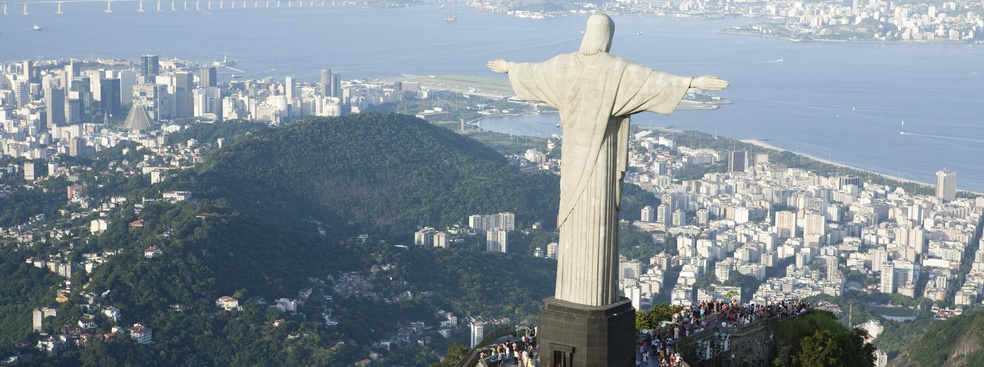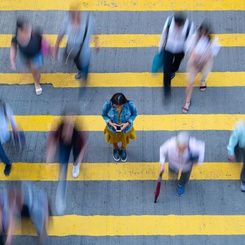As a society, our lives are intertwined by intricate economic and social relations. This pandemic is breaking links in that chain. What will come of it depends on how we, as a society, deal with the situation. The case of Brazil exemplifies the greater challenges developing countries face in dealing with this pandemic. The Brazilian government has fewer financial and logistical capacities to provide help, adopt policies, and assure a minimum production and distribution structure of supplies to fulfill basic needs during lockdowns.
Brazil, like many developing countries, is at a crossroads. With no quarantine, there will be a humanitarian tragedy. The health system cannot cope even with current health care needs, let alone the avalanche of critically ill patients brought by Covid-19.
Letting the virus run wild means facing a high mortality rate in the population in the coming months. The horror will last for a relatively short time, as both the contagion and the eventual death from the disease happen in a few days. From there, we bury the dead and life goes on. Or what's left of it. It is doubtful that the economy would remain immune to the chaos and the social unrest that might arise from the public calamity. This is the option that the president Bolsonaro seems to prefer. In a recent speech to the nation, he states he is against the quarantine strategy for it will ruin the economy, and he asks governors and mayors who are locally adopting confinement strategies to rethink their decisions.
Going against the president’s position, the Minister of Health is recommending quarantine. States with more cases of COVID-19 have locked down non-essential services, while others have forbidden only larger gatherings. Schools are closed in most of the country. While many people have entered a self-imposed quarantine, others are against it, voicing their dissatisfaction in motorcades. Interestingly, the organized crime groups have imposed curfews after 8pm in the favelas of Rio. Opinions are divided, both within the government and among the population.
The reluctance to adopt a lockdown in the country is understandable. The option of a quarantine for everyone lessens the immediate health tragedy, but creates another one, both now and later: the victims of the economic crisis. Brazil has a much more fragile economic situation than those of European countries, which are massively adopting lockdowns. Its income distribution is very unequal. Hence, although it is a middle-income country, as much as one fifth of its population lives with less than 5.5 dollars a day, while the richest 1% of the population keeps near 28% of the national income. Moreover, more than 40% of the Brazilian workers are in the informal sector, that is, they are either employees with no work contract or self-employed, not paying social security charges. This means that a large part of the population will need massive economic assistance during the pandemic crisis. The Brazilian government, in turn, is in a fragile fiscal condition due to the overspending in the past. Despite the recent rebalancing effort, the situation is still delicate: in 2019 the government ran a fiscal deficit of almost 6% of the GDP.
A lockdown will avoid overloading the health system and will prevent many deaths from illness in the immediate future. But what about those who cannot afford to feed themselves during the lockdown? And those who will lose their jobs? The companies that go bankrupt? The production structure that collapses? What will be left of the Brazilian economy after confinement? A humanitarian tragedy, again, seems to be the most likely scenario. It is a catch-22 situation. Unless…
There is no way out, unless there is an avalanche of solidarity. The solution I see is: lockdown + solidarity.
The government must, of course, do its part. So far, the Brazilian government has increased the Bolsa Familia program (a cash-transfer program directed to the poorer households); it is offering credit for small and medium-sized businesses with low interest rates and a 2-year grace period; and it will give a monthly aid of R $ 600 (about 150 euros) for informal workers. These initiatives are commendable, but far from sufficient. Beyond the financial needs, there are also several logistic issues that arise in a developing nation like Brazil. What is the best way to identify those in need, so that they get help? How to guarantee the supply of food to poor communities, where the markets are mostly informal? Furthermore, in the poorer areas, children get most of their food in the school. With the schools closed, they will have less to eat, and many will spend their days wandering around in insalubrious neighborhoods. It is not clear this situation will be less conducive to the spread of the virus. Overall, the government is failing in its role of leading the war against the virus. Some measures are being taken, but there are conflicting messages from the different spheres of the government and there is no unified team to organize a strategic plan to fight the epidemics in all fronts: economic, health, logistical and psychological.
Solidarity cannot come only from the government, particularly when it is showing so many flaws in dealing with the pandemic. Each of us, individually, must contribute. If you continue to receive your salary at the end of the month, paying the salary of your housekeeper who cannot work is a start. Paying your service providers in general (hairdresser, the restaurant you frequent…) is another way to help. At a broader level, you can help organize the distribution of food and medicine to those in need or financially contribute to initiatives that are emerging to address that need. Psychological help is also important. You can call elderly people who are alone to offer moral comfort. (You will see how comforted you will also feel in return!) Look around and see who and how you can help.
This pandemic is inviting us to experience solidarity, to learn that it is possible and pleasurable to have a simpler life and use the surplus to help those in need. I am sure that, one day, the Brazilian society will be more egalitarian. Then, we will look back and say, ashamed: how could we live in such inequality?








